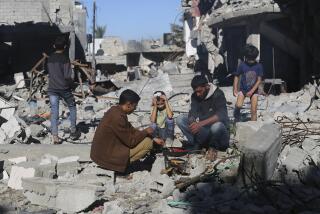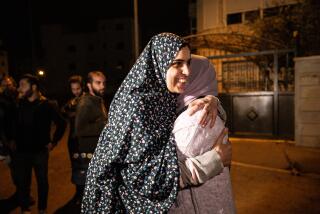U.S. Shifts Its Focus in Afghanistan to Prisoners
WASHINGTON — The military mission in Afghanistan shifted further from the battleground to the interrogation room Saturday, with the number of pro-Taliban prisoners in U.S. custody more than twice what it was the day before and expected to keep growing in the next several days.
Afghan opposition soldiers holding more than 3,000 prisoners transferred about 60 to American military authorities Friday, bringing to 136 the total enemy combatants being questioned by CIA and other U.S. interrogators, a Pentagon spokeswoman said. The detainees represent an apparently elite group of mostly Arab prisoners who have already been singled out and questioned by Afghan allies.
Defense Secretary Donald H. Rumsfeld prefers to let the more numerous Afghan forces hold the bulk of the prisoners, with U.S. troops taking control only of leaders and those fighters who might have information on the Al Qaeda global terrorist network. As they seek information on terrorist plans for future attacks, interrogators also are pressing the prisoners for clues to the whereabouts of the Taliban’s elusive leader, Mullah Mohammed Omar, and Osama bin Laden.
The transformation of the U.S. campaign in Afghanistan was highlighted Saturday by the first joint patrols in the capital, Kabul, by British and Afghan peacekeeping troops. The Afghan troops worked under a chain of command that begins with a new commander in chief, interim Prime Minister Hamid Karzai, who had assumed office just one week earlier. The British formed the vanguard of a U.N.-mandated peacekeeping force for which more troops are scheduled to arrive in early January.
With the military campaign in a mopping-up stage, U.S. forces can begin 2002 focusing on a broader campaign against terrorism worldwide, President Bush said in remarks that pointed to new conflicts in the coming year.
“This year ends with progress on the battlefield and accomplishment at home,” Bush said in his weekly radio address. “The men and women of our military have successfully fought a new kind of war. They applied new tactics and new technology to rout a new kind of enemy. The lessons we learn in Afghanistan will guide our military to the future and make our country stronger and more secure.”
Earlier Saturday, Afghan Defense Minister Mohammed Qassim Fahim urged the United States to end its bombing campaign, repeating his assertions of recent days that Bin Laden has probably fled from eastern Afghanistan to Peshawar, Pakistan.
“Osama is out of our control,” Fahim said. “America can pursue him with the help of the Pakistani government.”
Pentagon officials, however, said they had received no formal request to end U.S. airstrikes. Indeed, the Pentagon said that American B-1 bombers on Friday destroyed a leadership complex of the defeated Taliban regime 10 miles from the city of Gardeyz, near Afghanistan’s border with Pakistan. Still, the bombing campaign has ebbed significantly since earlier this month, when U.S. warplanes pounded suspected Al Qaeda redoubts in the mountainous Tora Bora region in eastern Afghanistan with as many as 200 bombs a day.
The number of prisoners in U.S. custody is expected to grow daily as questioning intensifies now that the ground war has evolved into a manhunt for Bin Laden and other Al Qaeda leaders, according to defense authorities.
“Over the next week or two, it’s probably going to be tricky to keep track” of the prisoners in U.S. hands, said Lt. Cmdr. Bruce Erickson, a spokesman for U.S. Central Command, which is directing the war in Afghanistan.
The bulk of the prisoners--125--are being held at Camp Rhino, a Marine base near the southern Afghan city of Kandahar. There are two at Bagram air base, one in the northern city of Mazar-i-Sharif and eight, including American Talib John Walker Lindh, in the brig aboard the amphibious assault ship Peleliu in the Arabian Sea.
The shift in the U.S. campaign is clear at Camp Rhino, where prisoners first arrived Dec. 17. Housing prisoners had been only a minor function there as recently as Thursday, when 25 new arrivals pushed the total to 62. That number doubled this weekend.
The Pentagon has ordered that a more permanent holding facility be prepared at Guantanamo Bay Naval Station in Cuba, but that work will probably take several weeks. Rumsfeld said recently that no decision had been made on whether Guantanamo would become the site of the military tribunals ordered by the president for certain foreign prisoners.
Officials in Communist Cuba, which has criticized the war in Afghanistan as imperialist, have criticized the decision to bring detainees to the Caribbean island. Higher Education Minister Fernando Vecino Alegret told reporters Saturday that the move was “a mistake” destined to draw international criticism.
Atty. Gen. Juan Escalona went further. “It’s another provocation from the Americans,” he said at the Cuban parliament. “I hope 15 or 20 get out and kill them.”
In Afghanistan, security is especially tight after the uprising last month at a prison overseen by Afghan opposition commanders in Mazar-i-Sharif, during which CIA agent Johnny “Mike” Spann was killed. When prisoners, some in shackles, arrive by air on the tarmac at Camp Rhino, Army military police escort them to a detention facility at the airport terminal surrounded by concertina wire.
The detainees are strip-searched, fingerprinted and then issued new clothes at two abandoned warehouses. Their identities are printed on wrist bracelets, and samples of their hair and blood are taken.
“These are potentially very dangerous people,” said Maj. Ian Brasure, a legal advisor for the 26th Marine Expeditionary Unit based at Rhino.
Nevertheless, he added: “When we get prisoners, we don’t torture them, we don’t perform medical experiments on them. We keep them warm, we keep them fed, we keep the rain off their heads.”
More to Read
Sign up for Essential California
The most important California stories and recommendations in your inbox every morning.
You may occasionally receive promotional content from the Los Angeles Times.










